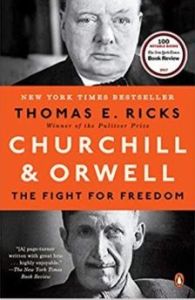Join getAbstract to access the summary!

Join getAbstract to access the summary!
Thomas E. Ricks
Churchill and Orwell
The Fight for Freedom
Penguin Press, 2017
What's inside?
Winston Churchill and George Orwell confronted a pivotal moment in history with moral clarity and personal courage.
Recommendation
The 1930s gave rise to totalitarianism in Stalin’s Soviet Union and Hitler’s Nazi Germany. Both threatened democracies like Great Britain. Thrust into the forefront of an apocalyptic moment in history, British political leader Winston Churchill and writer George Orwell responded with intellectual clarity and moral courage. They deciphered the facts of the crisis and trusted their higher principles. In response to today’s political and economic crises, historian Thomas E. Ricks offers lessons for contemporary leaders from their rigorous analysis and high standards of integrity.
Summary
About the Author
Thomas Edwin Ricks specializes in writing about military and national security issues. He wrote the bestseller Fiasco: The American Military Adventure in Iraq (2006) and its follow-up, The Gamble: General David Petraeus and the American Military Adventure in Iraq (2009).
















Comment on this summary